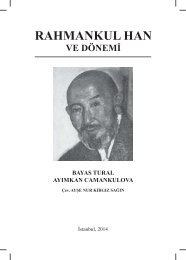THE SOVIET HISTORIOGRAPHY AND THE QUESTION OF KAZAKHSTAN’S HISTORY
SOVYET-TARIH-YAZICILIGI-ENG
SOVYET-TARIH-YAZICILIGI-ENG
You also want an ePaper? Increase the reach of your titles
YUMPU automatically turns print PDFs into web optimized ePapers that Google loves.
42<br />
<strong>THE</strong> <strong>SOVIET</strong> <strong>HISTORIOGRAPHY</strong> <strong>AND</strong><br />
Furthermore, Suleimenov also critiqued G. Togjanov. He tries to<br />
prove that Bekmakhanov was inspired by his book, titled the “Kazakh<br />
Colonial Village”. Bekmakhanov answered those accusations by saying,<br />
Are my critics unaware of that there are some examples of this<br />
case, even representatives of reactionary classes that praise most<br />
progressive individuals, in the cases which they are interested? As<br />
Zhirenshin said, ‘Alash Orda also benefitted from Abai and Shokan.’<br />
Why did I mentioned the nationalist A. Bokeikhanov, as you said?<br />
As you also know, in historical literature there is a work called “The<br />
letters of Orta Zhuz Khans and Sultans in the years of 1824-1830”<br />
which was published by Bokeikhanov. Why should we publish this<br />
important historical document as unnamed and in a mysterious way,<br />
just in order not to mention this person’s name? You talked about<br />
the nationalist Togjanov for half an hour. But there is not even one<br />
word about him in my book…” 50<br />
In order to label Bekmakhanov as an “Enemy of the People,” his<br />
critics had to make accusations that would politically crush him. It is<br />
not surprising that in this discussion, some Kazakh intellectuals used<br />
associations with the Alash party. During and after various prosecutions,<br />
all such accused Kazakh intellectuals tried to acquit themselves<br />
as they stood before the Russian Bolsheviks. But in most cases, it<br />
proved impossible. On the contrary, the Bolsheviks suspected such<br />
people and started to investigate them.<br />
Another topic raised was about the use of folklore materials. That<br />
was another aspect to prosecute the intellectuals to label them<br />
“nationalists”. Prohibiting the use of folklore materials, which were<br />
regarded as national sources, was quite widespread during this period.<br />
As for Bekmakhanov, he was one of the first historian-scientists<br />
who started to use folklore materials in his scholarship. He explained<br />
why by saying:<br />
For researching Kazakhstan’s history, the place of the folklore is<br />
quite important as historical source. It is because, up until second<br />
half of 19 th history, there was no written literature for the Kazakh<br />
people. The importance of folklore materials is that it supplies correct<br />
information about historical events and individuals. Because, it is the<br />
people themselves who wrote the history and who had direct contact<br />
with the incidents. Even though we do not talk about Kazakh folklore<br />
as a whole, we can say: because various incidents are told from start<br />
to end, the names of many individuals are given correctly and also<br />
because it includes much knowledge, what you call as folklore is a<br />
50 Bekmakhanov ibid, pp. 298-316.



